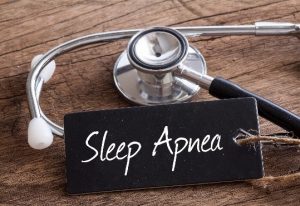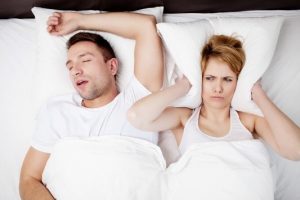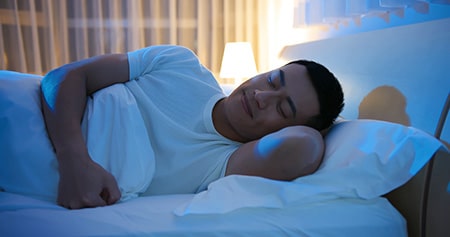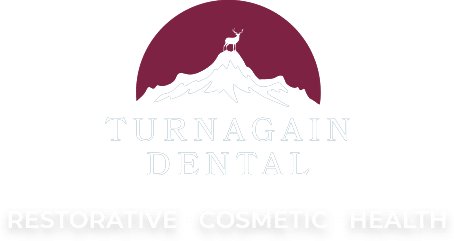 Concerned by loud snoring and sleep apnea symptoms in Anchorage? If you are seeing Dr. Kennedy for a routine exam, do not be surprised if he asks you questions about your sleep. This may be a part of a screening for sleep apnea, a potentially life-threatening disorder that many dentists are able to detect before general physicians. Perhaps you mentioned something earlier in your exam that caught Dr. Kennedy’s attention, or perhaps he has noticed something during your exam that suggests a problem.
Concerned by loud snoring and sleep apnea symptoms in Anchorage? If you are seeing Dr. Kennedy for a routine exam, do not be surprised if he asks you questions about your sleep. This may be a part of a screening for sleep apnea, a potentially life-threatening disorder that many dentists are able to detect before general physicians. Perhaps you mentioned something earlier in your exam that caught Dr. Kennedy’s attention, or perhaps he has noticed something during your exam that suggests a problem.
When left untreated, sleep apnea can affect quality of life and health significantly. Conscientious dentists like Dr. Kennedy are very attuned to the signs of the disorder because they know early detection could save a life.
What Is Sleep Apnea?
The most common type of sleep apnea is obstructive sleep apnea, in which a person stops breathing as they sleep and then wakes up gasping for air (without realizing it). This occurs when the tissues at the back of the throat collapse during sleep, blocking the airway and obstructing the flow of oxygen (and causing snoring or sputtering noises). These cessations in breath can happen hundreds of times per night in the most advanced cases.
Because individuals with sleep apnea are constantly waking up, they don’t get the quality restful sleep their bodies need. A chronically exhausted person is vulnerable to automobile or workplace accidents; they are also more likely to be obese. Studies now show that sleep apnea can raise the risk of stroke, cancer, diabetes and heart disease.
Dentists are at the forefront of sleep apnea detection because some of the signs appear in the mouth first. For example, one of the first signs of sleep apnea is tooth grinding. Chronic grinding wears down the surfaces of the teeth, which a dentist can easily notice during a routine exam. Or, some patients complain about waking up every morning with a dry mouth, which can signal to the dentist they may have a sleep disorder.
Signs You Suffer from Sleep Apnea
 The most obvious sign of sleep apnea is loud, uncontrollable snoring, which is usually pointed out by a significant other. Other symptoms of sleep apnea include the following:
The most obvious sign of sleep apnea is loud, uncontrollable snoring, which is usually pointed out by a significant other. Other symptoms of sleep apnea include the following:
- Waking up feeling exhausted, despite a seemingly full night of sleep
- Waking up with a sore throat or dry mouth
- Excessive daytime fatigue
- Difficulty concentrating or performing other cognitive functions
Diagnosing and Treating Sleep Apnea
If you experience any of these symptoms, you should schedule an appointment with your primary care physician or Dr. Kennedy. He can refer you to a sleep medicine specialist to have a sleep study. Although Dr. Kennedy is very knowledgeable about the symptoms and treatment of sleep apnea, he cannot formally diagnose the condition.
If a sleep specialist confirms that you suffer from sleep apnea, Dr. Kennedy can help. He can fit you for a special oral appliance to prevent further sleep apnea episodes.
Dr. Kennedy can also provide you with more information about making the appropriate lifestyle changes.
Types of Sleep Apnea
There are three main types of sleep apnea:
- Central Sleep Apnea – CSA occurs when the brain fails to send signals to the muscles that control breathing.
- Obstructive Sleep Apnea – OSA is a result of the airway passage being blocked by excessive tissue at the back of the tongue, throat or nose. OSA is the most common type of sleep apnea.
- Mixed Sleep Apnea – MSA, also known as complex sleep apnea, is a combination of central sleep apnea and obstructive sleep apnea.
Am I at Risk of Developing Sleep Apnea?
Anyone can develop sleep apnea, regardless of age or gender. However, there are some factors that can increase the risk of getting sleep apnea, including the following:
- Gender (men are twice as likely as women to develop sleep apnea
- Age (adults age 40 and older are more likely to be diagnosed with sleep apnea)
- Being overweight or obese (excess weight around the abdomen, chin or neck can reduce the effectiveness of the breathing muscles and/or compress the airway)
- Family history of sleep apnea
- Lower jaw that is smaller than the upper jaw
- Enlarged tonsils or adenoids (reduces amount of room for air to pass through airway)
- Regular consumption of alcohol, sedatives or tranquilizers
- Smoking (causes inflammation and fluid retention in the airways, reducing the space for air to pass through)
Regardless of whether you are at higher risk or not, there are several things you can do to reduce the occurrence of sleep apnea or cope with sleep apnea symptoms:
- Maintain a healthy weight
- Eliminate alcohol, tobacco, sedatives and other substances that can depress breathing (severely depressed breathing reflexes affect your ability to recover from breathing cessation in the night)
- Practice sleeping on your side and avoid sleeping on your back
What Is a Sleep Study?
A sleep study is a test that measures how well you sleep and is used to diagnose sleep disorders. Dr. Kennedy or your general physician may refer you to a sleep specialist if they suspect you are a chronic snorer or have other symptoms of sleep apnea. The sleep specialist may be a neurologist, pulmonologist, otolaryngologist or other type of medical professional with special training in the diagnosis and treatment of sleep disorders.
A sleep study can be performed at home or in a sleep laboratory under the direct supervision of a sleep specialist. Special equipment will be used to record your heart rate, blood pressure, eye movements and brain activity while you sleep. Your chest movements, the amount of oxygen in your blood, airflow through your nose, blood pressure and snoring while you sleep will also be measured. The sleep specialist will also pay close attention to the number of breathing cessations during your sleep to determine whether sleep apnea is present.
The information gathered by the sleep specialist will be evaluated and used to determine the presence and severity of sleep disorders, and an appropriate course of treatment.
Health Risks of Sleep Apnea
 While sleep apnea is associated with well-known symptoms such as snoring and fatigue, it is also linked to other serious health issues.
While sleep apnea is associated with well-known symptoms such as snoring and fatigue, it is also linked to other serious health issues.
High blood pressure: Sleep apnea, especially in severe cases, can lead to elevated blood pressure, also called hypertension. In healthy individuals, blood pressure naturally decreases at night. Those with obstructive sleep apnea experience less of this dip, which increases the risk for major cardiovascular problems. Sleep apnea may also affect blood pressure during the day.
Heart disease: When the condition goes untreated, sleep apnea puts patients at risk of irregular heartbeat, coronary artery disease, and congestive heart failure. Likewise, if you already have heart failure, sleep apnea can worsen the condition.
Stroke: The risk of stroke increases in patients with sleep apnea. Much like the risk of sleep-apnea-related high blood pressure, the more severe the sleep apnea, the greater the risk of stroke. Obstructive sleep apnea causes repeated episodes of disruptive breathing during the night, resulting in decreased oxygen saturation and changes to blood vessels in the brain.
Diabetes: If you have diabetes, sleep apnea can make managing your symptoms more difficult. When your breathing is disrupted during sleep, carbon dioxide in your blood increases, leading to insulin resistance which is when the body cannot effectively use insulin. This increases the amount of sugar in the blood and can worsen diabetes symptoms.
Sleep Apnea Treatment
Turnagain Dental uses oral appliance therapy to treat sleep apnea. For patients with mild to moderate sleep apnea, oral appliances can help keep the tongue from blocking the throat or repositioning the lower jaw. These appliances help keep the airway unobstructed during sleep, which reduces the number of disrupted breathing episodes at night.
If it is determined that an oral appliance is right for you, Dr. Kennedy will taking an impression of your teeth, which will be used to create the device. Once the device is ready, you will be brought in for a fitting to ensure the device is secure and comfortable. Dr. Kennedy will provide you with detailed instructions for using and cleaning your device so that you achieve the best results. He may need to make some adjustments over time to ensure that your oral device remains effective.
Compared to other sleep apnea treatments, oral appliance therapy offers a number of benefits, including:
- Improved symptoms of obstructive sleep apnea: Disruptive symptoms such as fatigue during the day, moodiness, and trouble with concentration are eliminated with the use of specialized oral appliances.
- Eliminates snoring: A jaw that is properly positioned during sleep encourages the airway to remain open, leading to fewer breathing interruptions and less snoring.
- Ideal solution for those intolerant to CPAP machines: Many patients have trouble using and cleaning their CPAP machines. These machines, which contain several different parts, are often cumbersome, loud, and uncomfortable to use during the night. A single oral appliance, which is quiet, comfortable, and does not require electricity, is often the preferred sleep apnea treatment in these cases.
- Is comfortable and effective: Your oral appliance is custom fitted for your mouth’s unique anatomy. You can expect enhanced comfort while using your appliance.
Contact Turnagain Dental
For more information about the detection or treatment of sleep apnea, don’t hesitate to contact Turnagain Dental and request an appointment with Dr. Kennedy. Call or email our office today.
